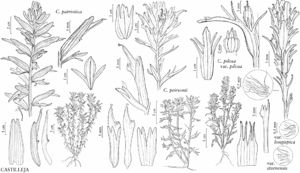Castilleja pilosa var. longispica
in A. Cronquist et al., Intermount. Fl. 4: 480. 1984.
Stems: hairs spreading or retrorse and curved, soft. Leaf lobes ascending-spreading. Inflorescences 2–16 cm; bracts proximally light green, or yellow-green, sometimes becoming pink or dull purple, with margins or distal portions pale yellow, sometimes soft pink or buff, 3–5(–9)-lobed; lobes erect, sometimes spreading, short to medium length, arising near or above mid length. Calyces 9–15(–20) mm; abaxial and adaxial clefts 2–7 mm, 40–45% of calyx length, lateral 2–5.5 mm, 40–50% of calyx length; lobes linear or narrowly triangular. Corolla beaks 4–7 mm; abaxial lip proximally green or pale yellow, sometimes dull purple, distally white to sometimes pink, 2.5–5 mm, 50–85% as long as beak; teeth white to pale yellow, rarely pink. 2n = 24, 48, 96.
Phenology: Flowering Jun–Aug.
Habitat: Moist to dry meadows, sagebrush steppes, woodlands, rocky slopes, ridges, montane.
Elevation: 1700–2000 m.
Distribution
Idaho, Mont., Wyo.
Discussion
Variety longispica is distributed across central and southeastern Idaho, as well as adjacent Montana and Wyoming. This variety is often somewhat variable in color within populations, ranging from pale greenish yellow to various shades of pale pink to pale purple.
Selected References
None.
